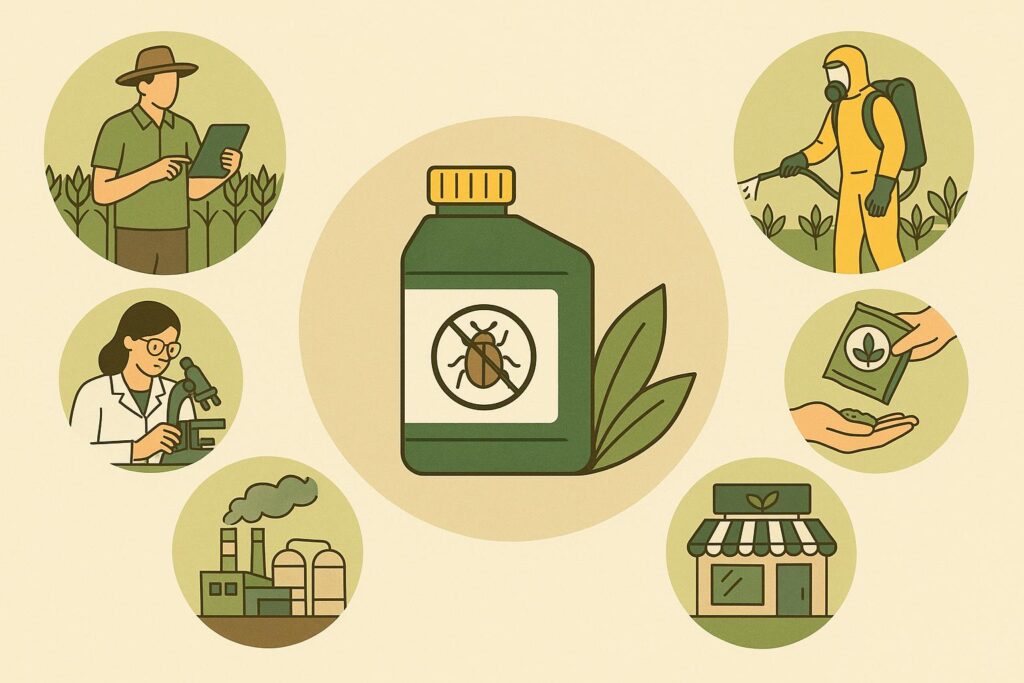The global agri-chemical market continues to expand as farmers seek effective solutions to pest and disease challenges. Among key players, profenophos stands out for its broad-spectrum insecticidal properties. Known for controlling resistant pests in cotton, vegetables, and rice, profenophos opens several business avenues for manufacturers, distributors, and service providers within the agricultural supply chain.
Why Profenophos Remains a Strategic Product in Crop Protection
Profenophos belongs to the organophosphate group and works by disrupting nerve signals in pests. Its dual action as a contact and systemic insecticide makes it valuable in Integrated Pest Management (IPM). Despite competition from newer chemistries, its affordability and effectiveness in controlling pests such as aphids, whiteflies, and bollworms continue to maintain its market demand.
Farmers worldwide continue to use profenophos due to:
- It has a strong knockdown effect on resistant pest populations.
- It’s compatibility with various pest control programs.
However, with the rise of resistance management needs and sustainable farming practices, profenophos offers unique business opportunities when integrated into broader market strategies.
Exporting Profenophos Formulations to Emerging Markets
Export opportunities for profenophos-based products are increasing, especially in Asia, Africa, and Latin America, where farming heavily relies on chemical pest control. These regions often face high pest pressure and limited access to newer agrochemicals.
Businesses can tap into export markets by:
- Developing region-specific formulations that meet local regulations.
- Partnering with local distributors for market penetration.
A successful export model often mirrors the diversified approach seen with products like Pulsor Thifluzamide 24% SC Fungicide, which meets specific disease control needs in rice production, highlighting the importance of adapting products to regional demands.
Supplying Active Ingredients to Formulators
The active ingredient (AI) market for profenophos offers significant potential. Formulators often rely on third-party suppliers for bulk AI procurement. By supplying high-purity profenophos, businesses can position themselves within the supply chain.
Key aspects include:
- Ensuring regulatory compliance for international trade.
- Providing reliable quality and batch consistency.
With the right quality assurance systems, AI suppliers can establish long-term contracts with pesticide manufacturers worldwide.
Manufacturing Customized Crop Protection Solutions
The market increasingly demands customized solutions tailored to specific crops and regions. This includes formulations that combine profenophos with compatible active ingredients to achieve synergistic effects.
Successful combinations can include selective insecticides or fungicides for integrated pest and disease management within a single spray.
For instance, combining insecticides with systemic fungicides aligns with market trends, particularly in markets such as rice, where growers often face both pest and fungal issues. A report by Agrochemical Market Intelligence highlights the rising demand for combination products in South Asia.
Contract Research and Development for Agri-Chemical Companies
Research assistance is often required by businesses seeking to introduce new formulations or enter previously untapped markets. A specialized business model is developed by offering contract R&D services with an emphasis on profenophos stability, efficacy, and field testing.
Research services may include:
- Conducting bio-efficacy studies and residue trials.
- Formulation development and regulatory support.
Specialized R&D firms help agri-chemical brands innovate while reducing time-to-market for new products.
“Agriculture is the noblest of all alchemy; for it turns earth, and even manure, into gold, conferring upon its cultivator the additional reward of health.” — Paul Chatfield
Offering Sustainable Crop Advisory Services Linked to Profenophos
Advisory services that teach farmers how to use pesticides responsibly have become increasingly important as awareness of pesticide resistance and its environmental impacts has grown.
Business models can include:
- Training farmers on safe application and resistance management.
- Offering integrated pest management programs incorporating profenophos strategically.
By encouraging responsible product use and fostering trust with farmers, agri-advisory platforms foster enduring client loyalty. Advisory services increase product adoption and decrease misuse, per the FAO Integrated Pest Management Guidelines.
Digital Platforms for Crop Protection Product Distribution
E-commerce platforms catering to the agricultural sector present a modern opportunity. By listing profenophos-based products online, businesses can reach farmers directly, bypassing traditional distribution channels.
Key factors for success include:
- Offering detailed product information, safety guidelines, and usage tips.
- Partnering with logistics providers for last-mile delivery.
Digital agriculture platforms also serve as valuable data sources, enabling companies to tailor product offerings based on regional pest trends and farmer preferences.
Developing Organic-Compliant Alternatives with Profenophos Analogues
Even though profenophos is a synthetic substance, the biopesticide sector may benefit from research into natural alternatives or bio-based formulations that replicate its mode of action. If companies invest in research to find similar efficacy within organic certification standards, they might be able to capture new market niches.
This approach enables consumers to switch to lower-risk products in response to growing demand for sustainable agriculture and regulatory changes. The development of green chemistry is opening up niche markets in this area.
Frequently Asked Questions About Profenophos Business Opportunities
- Is there still a strong global demand for profenophos?
Yes, especially in developing markets where resistance management and broad-spectrum control are critical for high-value crops. - What are the regulatory challenges in exporting profenophos?
Exporters must meet the pesticide registration requirements of each country, which include providing safety data, conducting efficacy trials, and assessing environmental impact. - Can profenophos be used in integrated pest management programs?
Yes, when used responsibly and rotated with other insecticide groups, profenophos remains a valuable IPM tool. - Where can I find global regulations governing the trade of pesticides?
The International Code of Conduct on Pesticide Management by FAO provides comprehensive guidelines.
Linking Market Trends to Future Opportunities
Businesses are compelled to develop safer application technologies and integrated solutions in response to the growing adoption of sustainable agriculture practices. When paired with advice services and precision farming equipment, Profenophos aligns with these developments.
Businesses that focus on innovative application strategies, such as digital advisory services or drone spraying, find that they are more aligned with what the market will demand in the future.
How Regional Pest Trends Drive Demand for Profenophos
The pressures from pests vary by location. For instance, Southeast Asian vegetable farmers use profenophos to combat aphids and whiteflies, while cotton producers in India and Pakistan primarily rely on it to control bollworms.
Maintaining a competitive edge and improving market relevance are two benefits of tailoring business strategies to local pest profiles. Forecasts of pesticide demand and pest trends can be found in market insights from sources such as the CropLife International Reports.
Collaborating with Agricultural Cooperatives and Farmer Groups
Partnering with cooperatives or organized farmer groups helps businesses distribute profenophos-based products efficiently. These partnerships also serve as channels for educating consumers about the product and training them in responsible usage.
Cooperatives play a significant role as influencers within farming communities, often setting purchasing trends and promoting best practices.
How Value-Added Services Strengthen Profenophos Business Models
In addition to selling products, offering services such as insect scouting, environmental monitoring, and residue testing creates a holistic business strategy. These services help farmers comply with safety regulations and optimize product consumption.
By positioning companies as solution providers rather than merely suppliers, these integrated models promote brand awareness and foster customer loyalty.
Leveraging Technology to Enhance Market Reach
Technology-driven services, such as mobile apps, e-learning platforms, and virtual advisory sessions, make knowledge sharing on profenophos safer use and best practices more scalable.
These tools help reach remote farming communities, ensuring better adoption and responsible use of the product. Businesses that invest in digital education build stronger connections with end-users.
The Rise of Precision Agriculture in Pesticide Application
Environmental impact and chemical waste are reduced through precision farming. Businesses can capitalize on a growing market by offering application technology specifically designed for profenophos, such as automated sprayers or calibrated nozzles.
Precision tools help ensure that environmental regulations are followed while also increasing application efficiency.
Expanding Into Customized Packaging Solutions for Agri-Chemicals
The packing requirements of large-scale growers and smallholder farmers often differ. Meeting a range of market demands by providing bespoke packaging sizes, from bulk containers for commercial farms to sachets for individual use.
Innovations in packaging, such as eco-friendly materials or user-friendly designs, can improve product attractiveness and handling compliance.
Strengthening Brand Trust Through Certification and Transparency
Brand reputation is enhanced by obtaining certifications, such as third-party safety validation or ISO standards for manufacturing. Clear usage guidelines and transparent labeling increase farmer confidence and reduce the likelihood of misuse.
Companies that place a high priority on certification procedures often gain greater access to markets, particularly in export-oriented markets.
Exploring Collaborative Research with Agricultural Institutes
Scientific credibility is enhanced by collaborating on safe usage guidelines and efficacy studies of profenophos with academic institutions or agricultural research institutes.
These collaborations offer prospects for product co-development with institutional support, access to field data, and fresh perspectives on pest dynamics.
Building Sustainable Supply Chains for Long-Term Growth
In the agri-chemical industry, a dependable supply chain is crucial, spanning from raw ingredients to delivery to end-users. Establishing alliances with reputable logistics companies, distribution networks, and suppliers ensures product availability and market responsiveness.
By reducing the risk of market shocks or regulatory changes, sustainable supply chains improve the resilience of businesses.
The Expanding Role of Agri-Chemical Trade Fairs and Industry Events
Attending trade shows and industry expos provides direct access to distributors, buyers, and other business associates. These platforms are ideal for tracking market trends, forming alliances, and introducing new profenophos formulations.
Companies are positioned as active participants in the global agri-chemical community when they regularly attend such events.
Reframing the Agri-Chemical Business for the Next Decade
Technological advancements, changes in regulations, and shifting farmer expectations are all contributing to the rapid evolution of the agri-chemical industry. Companies that view profenophos as an integrated solution rather than just a product will benefit the most.
The future is in integrating product sales with value-added services, knowledge sharing, and sustainable practices, from digital advising platforms to precision application tools.
Businesses that modify their business models to take an all-encompassing approach will not only expand, but also contribute to the development of an ethical, successful, and sustainable agricultural future.


